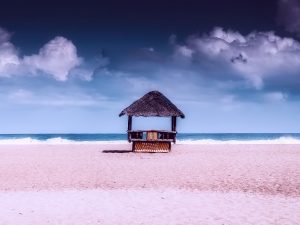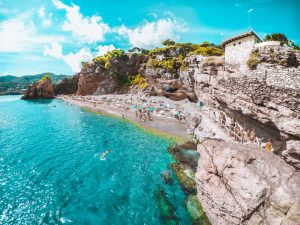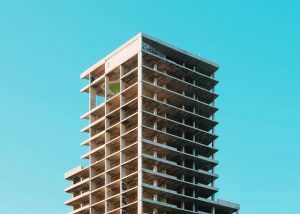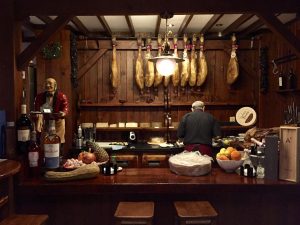Buying a house, apartment or villa in Spain: what to look out for
4 Jan 2018
A home of your own, a place under the Spanish sun? Yes, admittedly,
it sounds like music to the ears. But it is not a purchase you tread lightly over. You are about to spend a lot of money, so the necessary homework is necessary.
At the risk of kicking in a wide open door, the best advice we can give: think about it carefully. One night of ice cream is thin. Especially in Spain, where it rarely freezes in some regions.

Is your Spanish dream indomitable? Do you dream only in Spanish? Would you rather buy an apartment, house or villa in your Promised Land today than tomorrow? These are the things to look out for when making your decision:
Decide where you want to live
Spain is bigger than the handkerchief called Belgium. The differences between different regions are corresponding, in terms of climate, mentality, price of real estate and you name it.

While it is still weather in Malaga to sit on a terrace in T-shirt and shorts, northern Spaniards are already tightening their scarves. Real estate prices are corresponding: in southern Spain you will pay more than in the north. Keep that in mind.
[gallery link="file" wpmf_folder_id="0,0,0,0,0,0" ids="1121,1120"]
Location is a key element
And this is because it is about the only thing you really can't change. You can remodel a bathroom, but you cannot teleport a residence in the wrong place - for now. Location is also important if you want to rent out, or resell, the residence. Houses and apartments in tourist areas are sweeter buns than their counterparts in Spanish negroes.
But what is a good location? Much depends on your personal needs and preferences. Some want to be able to drink a coffee or eat a plate of paella within walking distance; others don't want to take more than ten steps to the beach. For some, having a bus stop nearby is crucial, while others swear by the tranquility of a remote location.
Many "Spanish Belgians" want to keep the line with the homeland as short as possible. In that respect, you should take into account the distance from the residence to a local airport with regular flights to and from Belgium.
Emigrating or second residence?
Do you want to move to Spain effectively? Or will you continue to live in Belgium and serve Spain as your second home? It is an important consideration. In the first case, the overall picture is most important. Do you feel at home there? How is the quality of life there? In the second, it is best to aim for apartments and houses under development. In either case, you need to know well where you end up (see next bullet points). Go there on vacation, soak up the atmosphere.
[caption id="attachment_1126" align="aligncenter" width="533"]

Admit it ... there are less pleasant tasks.[/caption]
Buying purely as an investment is a separate case. Aim for tourist hotspots on the coasts or in major cities. Such residences assure you a good rental income and are likely to only increase in value.
Do your research ... but also go on site
A lot of research you can do beforehand. Make a list of desires for yourself. On it, you write down your absolute
musts and
do' s. Of course, that list is different for everyone. That noisy disco down the street is hell for some, heaven for others.
[caption id="attachment_1124" align="aligncenter" width="533"]

One's hell is another's heaven.[/caption]
But all research notwithstanding, you have to pass there in person anyway. Take your time for that. Visit several homes you have your eye on, that way you can best see the assets and flaws. Ideally, you visit once a season. If you don't have time for that, visit during the season you think you will spend the most time there.
A home can look like a dream in photographs, until on site it turns out that the contractor never finished the building. And that the surroundings look like a dump. Or that the utilities are not connected. Of course, you want to avoid that at all costs.
Therefore, never just buy a dream home on the Internet without having seen it in person. That sounds rather obvious, but you would be amazed how many naive souls fall into that trap, smitten with a pile of rocks they have seen online.
Define what your dream home should look like
Questions to ask:
- How many (sleeping) rooms does the residence have? What are the facilities? Is there a balcony?
- Is there a pool and a garden? A janitor? Parking?
- Is Fikkie allowed inside or are pets not allowed?
- Can you rent it out when you are not there? How much can you bring in with that?
It is also important to know how much time you are going to spend there. If you spend several months a year there, then you will probably want a larger living area than if you only go there occasionally for a weekend.
Do you want an apartment or a house? Or maybe even a piece of land on which you will plant your own dream home? Are you going for the city, the coast or the countryside? A new or an old building? You can estimate the condition of the residence when you go on site. In Spain, older houses are not always built to the highest standards. Have that fully figured out by people who know about it, especially a contractor or architect.
Brand-new home stoves are often the most expensive, but you know what you are getting. Existing houses sometimes require remodeling or other investments. You can also choose to buy before the house is built. It's cheaper, but make sure you are dealing with a broker you can trust. For example, Gold Estates only works with construction promoters who have bank guarantees. This ensures that you are not throwing your money into the Mediterranean Sea. With less kosher brokers, on the other hand, there is a risk that the developer will go bankrupt and your dream home will turn into a mirage.
[caption id="attachment_1123" align="aligncenter" width="300"]

This apartment building in Barcelona was never finished. A risk when dealing with rogue brokers.[/caption]
Residence periods also play a role. In summer on the Costa's air conditioning is not a luxury, in winter you have less of one. In high season, it is best to have a permanent parking space in tourist areas. Or you risk spending more time spinning around in your car than enjoying the sun.
Environment is also important
[caption id="attachment_809" align="aligncenter" width="533"]

For some, being able to have a bite to eat nearby is important.[/caption]
When you move, it is best to end up somewhere you are completely comfortable. And really, with a vacation home, it is no different. That cozy feeling of coming home depends on a myriad of factors. Of course, you would like to stay in a safe neighborhood where there are plenty of stores and other facilities.
When you go out prospecting, use all your senses to take in the neighborhood.
Is the residence located in a quiet residential area or a lively working-class neighborhood? Spaniards live more at night anyway. If the noise from that neighborhood café terrace already annoys you when you visit, it will not improve once you stay there. Don't take the pros and cons lightly.
Better good neighbors than distant friends. That cliché is certainly true in Spain. Consider the type of people - Is it mostly locals or expats? Young or old? Permanent residents or tourists? - and consider whether you can get along with them. Feel free to chat with local residents. They are the best, most reliable source about life in the neighborhood.
Not insignificantly, what happens to other residences in the neighborhood? What do they look like? And does their price rise or fall?
Set a budget and stick to it

The Spanish real estate market is attractive. Even though it is no longer the land of milk and honey that it was after the real estate bubble, a smart investor can still make a good deal there. This does not necessarily mean that properties in Spain are always cheap. Of course, you get what you pay for.
When setting your budget, keep in mind that the cost of housing is not the only factor of importance. Remember that additional fees, taxes and other charges can seriously drive up your costs. Think of transfer tax, VAT and registration fee. Because of the band, you can count on 10 percent on top of the purchase price. You also pay taxes on the spot. Its size depends on many factors, including whether you are renting or leasing.
Engage an expert

You may think you can save money by not using a lawyer. Your right, but consider that professional help can save you some serious headaches. For example, a lawyer specializing in Spanish real estate law can find out if the seller of the house is also the effective owner. And check if there are any debts attached to the property, as they will be shoved down your neck if necessary. Your attorney can also help you apply for a tax number, draft or proofread a purchase agreement and so much more.
Make sure you know what is happening at all times. Buying in Spain can sometimes be intimidating because you don't always understand the language. Then let your lawyer clear the question marks.
Scams used to be rife in Spain. This was not only about houses with debts attached, but also illegally constructed buildings, corruption and bribes. People with good intentions got into trouble that way. Fortunately, the Spanish government has straightened things out and there are far fewer disputes versus before. Still, it's best to play it safe. Buying real estate is not child's play and in Spain, moreover, different legal rules from law books in another language apply. So do not commit the worst of the seven deadly sins. For pride comes before a fall.
 Is your Spanish dream indomitable? Do you dream only in Spanish? Would you rather buy an apartment, house or villa in your Promised Land today than tomorrow? These are the things to look out for when making your decision:
Is your Spanish dream indomitable? Do you dream only in Spanish? Would you rather buy an apartment, house or villa in your Promised Land today than tomorrow? These are the things to look out for when making your decision:
 While it is still weather in Malaga to sit on a terrace in T-shirt and shorts, northern Spaniards are already tightening their scarves. Real estate prices are corresponding: in southern Spain you will pay more than in the north. Keep that in mind.
[gallery link="file" wpmf_folder_id="0,0,0,0,0,0" ids="1121,1120"]
While it is still weather in Malaga to sit on a terrace in T-shirt and shorts, northern Spaniards are already tightening their scarves. Real estate prices are corresponding: in southern Spain you will pay more than in the north. Keep that in mind.
[gallery link="file" wpmf_folder_id="0,0,0,0,0,0" ids="1121,1120"]
 Admit it ... there are less pleasant tasks.[/caption]
Buying purely as an investment is a separate case. Aim for tourist hotspots on the coasts or in major cities. Such residences assure you a good rental income and are likely to only increase in value.
Admit it ... there are less pleasant tasks.[/caption]
Buying purely as an investment is a separate case. Aim for tourist hotspots on the coasts or in major cities. Such residences assure you a good rental income and are likely to only increase in value.
 One's hell is another's heaven.[/caption]
But all research notwithstanding, you have to pass there in person anyway. Take your time for that. Visit several homes you have your eye on, that way you can best see the assets and flaws. Ideally, you visit once a season. If you don't have time for that, visit during the season you think you will spend the most time there.
A home can look like a dream in photographs, until on site it turns out that the contractor never finished the building. And that the surroundings look like a dump. Or that the utilities are not connected. Of course, you want to avoid that at all costs.
Therefore, never just buy a dream home on the Internet without having seen it in person. That sounds rather obvious, but you would be amazed how many naive souls fall into that trap, smitten with a pile of rocks they have seen online.
One's hell is another's heaven.[/caption]
But all research notwithstanding, you have to pass there in person anyway. Take your time for that. Visit several homes you have your eye on, that way you can best see the assets and flaws. Ideally, you visit once a season. If you don't have time for that, visit during the season you think you will spend the most time there.
A home can look like a dream in photographs, until on site it turns out that the contractor never finished the building. And that the surroundings look like a dump. Or that the utilities are not connected. Of course, you want to avoid that at all costs.
Therefore, never just buy a dream home on the Internet without having seen it in person. That sounds rather obvious, but you would be amazed how many naive souls fall into that trap, smitten with a pile of rocks they have seen online.
 This apartment building in Barcelona was never finished. A risk when dealing with rogue brokers.[/caption]
Residence periods also play a role. In summer on the Costa's air conditioning is not a luxury, in winter you have less of one. In high season, it is best to have a permanent parking space in tourist areas. Or you risk spending more time spinning around in your car than enjoying the sun.
This apartment building in Barcelona was never finished. A risk when dealing with rogue brokers.[/caption]
Residence periods also play a role. In summer on the Costa's air conditioning is not a luxury, in winter you have less of one. In high season, it is best to have a permanent parking space in tourist areas. Or you risk spending more time spinning around in your car than enjoying the sun.
 For some, being able to have a bite to eat nearby is important.[/caption]
When you move, it is best to end up somewhere you are completely comfortable. And really, with a vacation home, it is no different. That cozy feeling of coming home depends on a myriad of factors. Of course, you would like to stay in a safe neighborhood where there are plenty of stores and other facilities.
When you go out prospecting, use all your senses to take in the neighborhood.
Is the residence located in a quiet residential area or a lively working-class neighborhood? Spaniards live more at night anyway. If the noise from that neighborhood café terrace already annoys you when you visit, it will not improve once you stay there. Don't take the pros and cons lightly.
Better good neighbors than distant friends. That cliché is certainly true in Spain. Consider the type of people - Is it mostly locals or expats? Young or old? Permanent residents or tourists? - and consider whether you can get along with them. Feel free to chat with local residents. They are the best, most reliable source about life in the neighborhood.
Not insignificantly, what happens to other residences in the neighborhood? What do they look like? And does their price rise or fall?
For some, being able to have a bite to eat nearby is important.[/caption]
When you move, it is best to end up somewhere you are completely comfortable. And really, with a vacation home, it is no different. That cozy feeling of coming home depends on a myriad of factors. Of course, you would like to stay in a safe neighborhood where there are plenty of stores and other facilities.
When you go out prospecting, use all your senses to take in the neighborhood.
Is the residence located in a quiet residential area or a lively working-class neighborhood? Spaniards live more at night anyway. If the noise from that neighborhood café terrace already annoys you when you visit, it will not improve once you stay there. Don't take the pros and cons lightly.
Better good neighbors than distant friends. That cliché is certainly true in Spain. Consider the type of people - Is it mostly locals or expats? Young or old? Permanent residents or tourists? - and consider whether you can get along with them. Feel free to chat with local residents. They are the best, most reliable source about life in the neighborhood.
Not insignificantly, what happens to other residences in the neighborhood? What do they look like? And does their price rise or fall?
 The Spanish real estate market is attractive. Even though it is no longer the land of milk and honey that it was after the real estate bubble, a smart investor can still make a good deal there. This does not necessarily mean that properties in Spain are always cheap. Of course, you get what you pay for.
When setting your budget, keep in mind that the cost of housing is not the only factor of importance. Remember that additional fees, taxes and other charges can seriously drive up your costs. Think of transfer tax, VAT and registration fee. Because of the band, you can count on 10 percent on top of the purchase price. You also pay taxes on the spot. Its size depends on many factors, including whether you are renting or leasing.
The Spanish real estate market is attractive. Even though it is no longer the land of milk and honey that it was after the real estate bubble, a smart investor can still make a good deal there. This does not necessarily mean that properties in Spain are always cheap. Of course, you get what you pay for.
When setting your budget, keep in mind that the cost of housing is not the only factor of importance. Remember that additional fees, taxes and other charges can seriously drive up your costs. Think of transfer tax, VAT and registration fee. Because of the band, you can count on 10 percent on top of the purchase price. You also pay taxes on the spot. Its size depends on many factors, including whether you are renting or leasing.
 You may think you can save money by not using a lawyer. Your right, but consider that professional help can save you some serious headaches. For example, a lawyer specializing in Spanish real estate law can find out if the seller of the house is also the effective owner. And check if there are any debts attached to the property, as they will be shoved down your neck if necessary. Your attorney can also help you apply for a tax number, draft or proofread a purchase agreement and so much more.
Make sure you know what is happening at all times. Buying in Spain can sometimes be intimidating because you don't always understand the language. Then let your lawyer clear the question marks.
Scams used to be rife in Spain. This was not only about houses with debts attached, but also illegally constructed buildings, corruption and bribes. People with good intentions got into trouble that way. Fortunately, the Spanish government has straightened things out and there are far fewer disputes versus before. Still, it's best to play it safe. Buying real estate is not child's play and in Spain, moreover, different legal rules from law books in another language apply. So do not commit the worst of the seven deadly sins. For pride comes before a fall.
You may think you can save money by not using a lawyer. Your right, but consider that professional help can save you some serious headaches. For example, a lawyer specializing in Spanish real estate law can find out if the seller of the house is also the effective owner. And check if there are any debts attached to the property, as they will be shoved down your neck if necessary. Your attorney can also help you apply for a tax number, draft or proofread a purchase agreement and so much more.
Make sure you know what is happening at all times. Buying in Spain can sometimes be intimidating because you don't always understand the language. Then let your lawyer clear the question marks.
Scams used to be rife in Spain. This was not only about houses with debts attached, but also illegally constructed buildings, corruption and bribes. People with good intentions got into trouble that way. Fortunately, the Spanish government has straightened things out and there are far fewer disputes versus before. Still, it's best to play it safe. Buying real estate is not child's play and in Spain, moreover, different legal rules from law books in another language apply. So do not commit the worst of the seven deadly sins. For pride comes before a fall.










